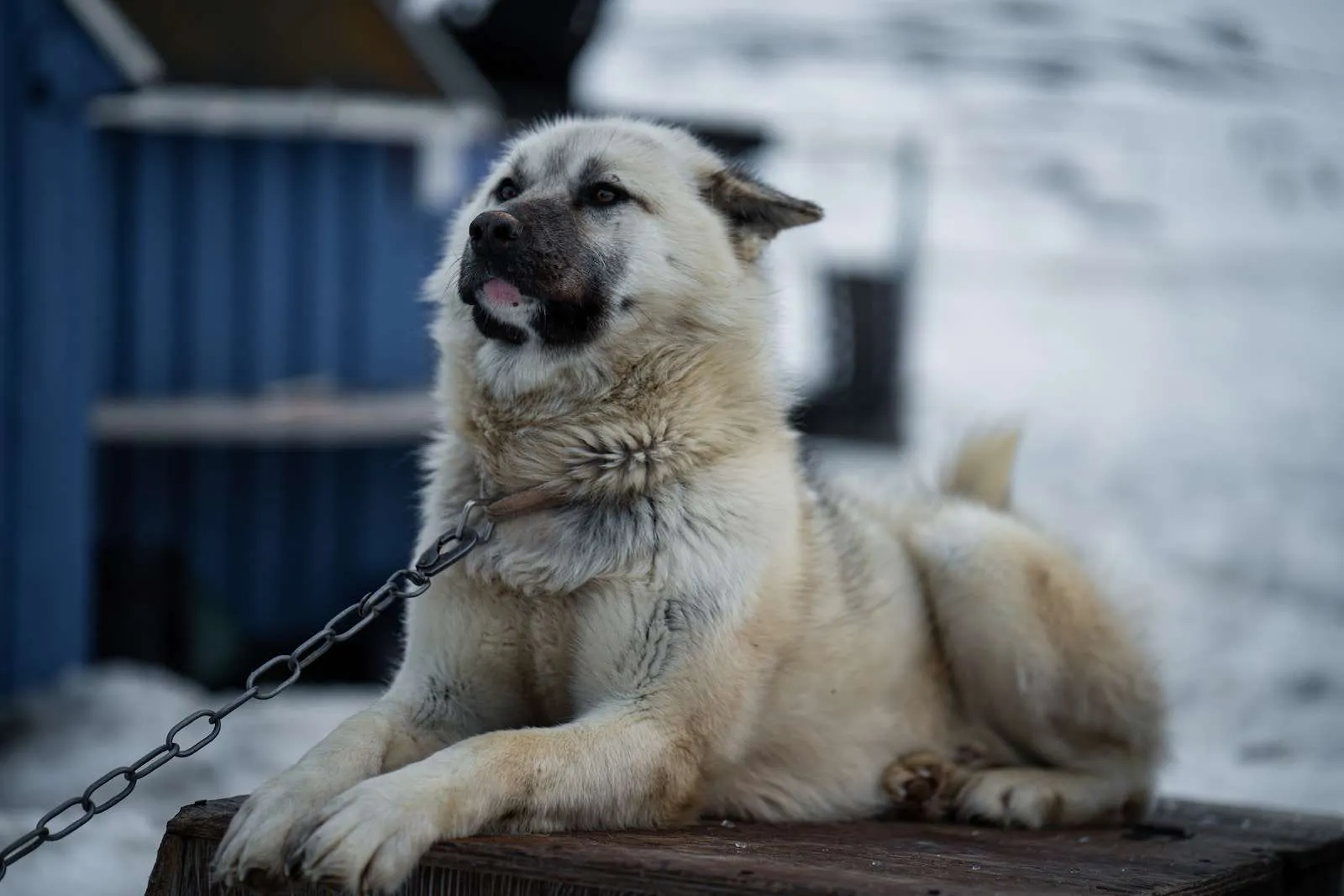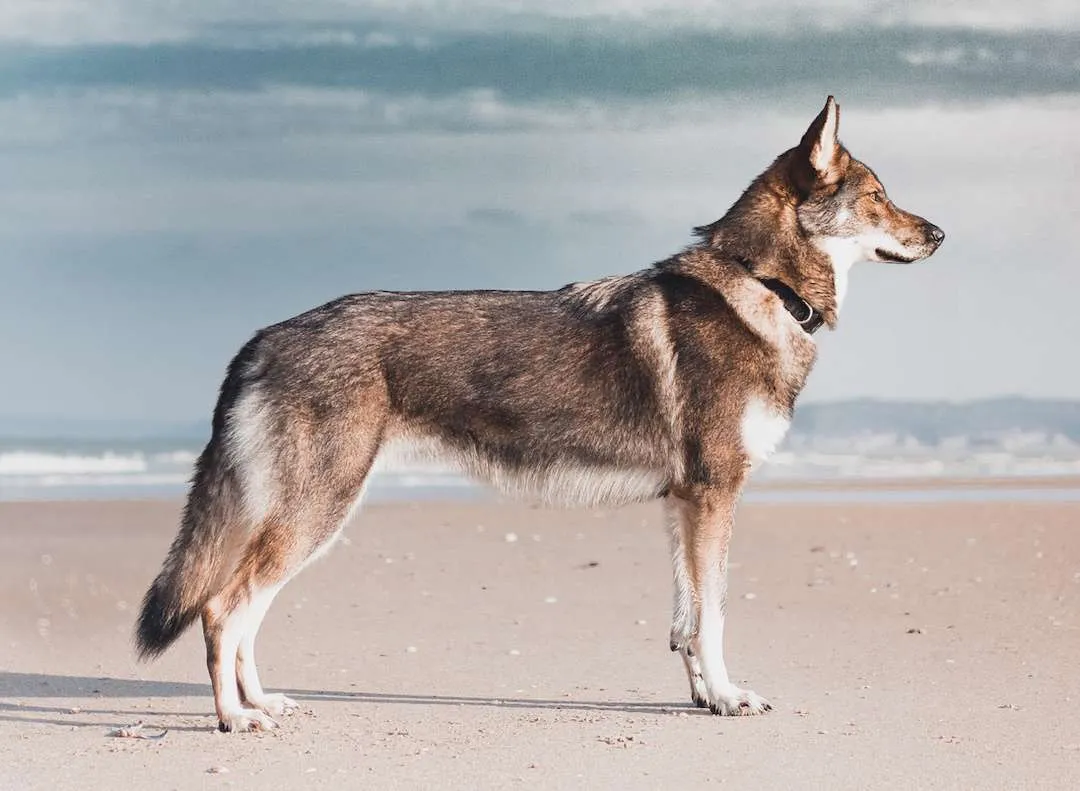Statistics:
- Height: 25 to 29 inches (64 to 74 cm)
- Weight: 90 to 150 pounds (41 to 68 kg)
- Life Span: 10 to 14 years
- Diet: A balanced diet consisting of high-quality dog food with appropriate protein, fat, and essential nutrients.
King Shepherd Overview:
The King Shepherd is a majestic and powerful large-sized breed that was developed in the United States during the early 1990s. This breed is a mix of German Shepherds, Alaskan Malamutes, and Great Pyrenees, bred with the intention of creating a versatile working dog with the intelligence and loyalty of the German Shepherd, the strength of the Alaskan Malamute, and the protective instincts of the Great Pyrenees. King Shepherds have become popular not only as working dogs but also as loving family pets due to their affectionate and loyal nature.
King Shepherd Highlights:
- Gentle Giant: Despite their large size, King Shepherds are known for their gentle and kind demeanor, making them excellent companions for families, including children.
- Intelligent and Trainable: These dogs are highly intelligent and eager to please, which makes training them a rewarding experience for both the dog and the owner.
- Versatile Working Dog: King Shepherds excel in various roles, including herding, search and rescue, therapy work, and as service dogs.
King Shepherd Evolution and History:
The King Shepherd was developed in the United States in the early 1990s by American breeders David Turkheimer and Shelly Watts-Cross. They aimed to create a large and versatile working dog that possesses desirable traits from its parent breeds, including intelligence, loyalty, and physical prowess. By selectively breeding German Shepherds, Alaskan Malamutes, and Great Pyrenees, they successfully produced the King Shepherd, a breed that could excel in various tasks while maintaining a calm and gentle temperament.
King Shepherd Size and Weight:
King Shepherds are large dogs, with males typically standing between 28 to 29 inches at the shoulder and weighing between 100 to 150 pounds. Females are slightly smaller, ranging from 25 to 27 inches in height and weighing between 90 to 120 pounds.
King Shepherd Personality:
The King Shepherd is known for its loyal, devoted, and protective nature. While they may appear imposing due to their size, they are typically gentle and affectionate with their families. They are intelligent dogs that form strong bonds with their owners, making them excellent watchdogs and family protectors.
The Adaptability of the King Shepherd:
King Shepherds are adaptable dogs that can thrive in various living environments, including suburban homes with yards or rural settings. They are social animals that prefer to be close to their families and may experience separation anxiety if left alone for extended periods.
King Shepherd Temperament:
The King Shepherd’s temperament is characterized by its loyalty, intelligence, and protective instincts. They are wary of strangers, making them excellent guard dogs. However, early socialization and training are essential to ensure they remain well-mannered and confident in various situations.
King Shepherd Maintenance and Grooming:
The King Shepherd has a double coat with a dense and water-resistant undercoat and a longer, straight outer coat. Regular brushing is necessary, especially during shedding seasons, to maintain the coat’s health and prevent matting.
The Trainability of the King Shepherd:
King Shepherds are highly trainable due to their intelligence and eagerness to please their owners. Positive reinforcement methods work best with this breed, as they respond well to praise and rewards.
Exercise Needs of the King Shepherd:
Being an active and energetic breed, King Shepherds require regular exercise to keep them physically and mentally stimulated. Daily walks, playtime, and interactive activities are essential to meet their exercise needs.
King Shepherd Health:
As with any dog breed, King Shepherds can be prone to certain health issues. Responsible breeders focus on minimizing these risks through careful breeding practices. Some potential health concerns for King Shepherds include:
- Hip Dysplasia: A common genetic condition where the hip joint doesn’t develop properly, leading to pain and mobility issues.
- Elbow Dysplasia: Similar to hip dysplasia, but affecting the elbow joint instead.
- Bloat: A potentially life-threatening condition where the stomach becomes distended and twisted, cutting off blood supply to vital organs.
King Shepherd Care:
Regular veterinary check-ups, a balanced diet, and an active lifestyle are essential components of caring for a King Shepherd and ensuring their overall well-being.
King Shepherd Feeding:
A high-quality dog food that meets the nutritional needs of large breeds is essential to keep the King Shepherd healthy and at an appropriate weight.
King Shepherd Coat Color and Grooming:
King Shepherds come in a variety of coat colors, including black and tan, sable, and solid black. Regular grooming and bathing as needed will help keep their coat clean and free from mats.
King Shepherd and Children:
King Shepherds are generally good with children and can be gentle and patient with them. However, due to their large size, supervision and proper training are essential to ensure positive interactions between the dog and children.
King Shepherd and Other Pets:
Proper socialization and early introductions to other pets can help King Shepherds get along well with other animals in the household. Their friendly nature can make them compatible with other dogs and pets if they are raised together and taught to coexist harmoniously.
Similar Dogs:
- German Shepherd: As one of the parent breeds, the German Shepherd shares similar intelligence, loyalty, and protective instincts with the King Shepherd. Both breeds are versatile working dogs with excellent trainability.
- Alaskan Malamute: The Alaskan Malamute is another parent breed of the King Shepherd, and they both share a strong and muscular build. Both breeds are known for their endurance and strength, making them excellent working dogs in various roles.
- Great Pyrenees: The Great Pyrenees is the third parent breed of the King Shepherd. Both breeds possess protective instincts and are well-suited for guarding and protecting their families and property.
King Shepherd FAQs (Frequently Asked Questions)
- What Were King Shepherds Bred For?King Shepherds, often referred to as the majestic giants of the dog world, are a relatively new breed that has quickly gained popularity among dog enthusiasts. With their impressive size and regal appearance, it’s easy to understand why these magnificent canines have captured the hearts of many. But what exactly… Read more: What Were King Shepherds Bred For?
- Are King Shepherds Good Family Dogs?Choosing the right dog breed for your family can be an exciting but challenging task. With so many options available, it’s important to consider various factors such as temperament, size, and energy levels to ensure a perfect match. One lesser-known yet remarkable breed worth considering is the King Shepherd. Overview… Read more: Are King Shepherds Good Family Dogs?
- Are King Shepherds Easy To Train?When it comes to finding the perfect furry companion, many potential pet owners consider factors such as size, temperament, and trainability. If you’re on the lookout for a trainable dog breed that combines intelligence with loyalty, you might have stumbled upon the majestic King Shepherd. The Intelligence of King Shepherds… Read more: Are King Shepherds Easy To Train?
- Can King Shepherds Live In Apartments?Are you considering adding a furry friend to your apartment life? If so, one breed that might catch your attention is the majestic King Shepherd. Known for their regal appearance and loyal nature, these large dogs possess numerous qualities that make them desirable pets. However, before making a decision, it’s… Read more: Can King Shepherds Live In Apartments?
- Are King Shepherds Hypoallergenic?Hypoallergenic dogs have gained immense popularity among individuals who suffer from allergies but still desire a furry companion. These special canines are known for producing fewer allergens, making them less likely to trigger allergic reactions in sensitive individuals. If you’re considering adding a King Shepherd to your family and have… Read more: Are King Shepherds Hypoallergenic?
- What type of coat do King Shepherds have?Welcome to our comprehensive guide on the magnificent coat of King Shepherds! If you’re considering getting a King Shepherd or are simply curious about this breed’s unique characteristics, you’ve come to the right place. In this article, we’ll dive deep into their coat type, shedding patterns, grooming needs, and much… Read more: What type of coat do King Shepherds have?
- Are King Shepherds Good For First Time Owners?The Rising Popularity of King Shepherds In the world of dog breeds, King Shepherds have been gaining popularity in recent years. Their majestic appearance and loyal nature make them an attractive choice for many potential pet owners. However, before deciding whether a King Shepherd is right for you as a… Read more: Are King Shepherds Good For First Time Owners?
- Are King Shepherds Good With Other Dogs?The Nature of King Shepherds King Shepherds, known for their striking appearance and regal demeanor, are large and powerful dogs that were bred to be versatile working animals. They possess a confident, intelligent, and assertive nature. While these traits make them excellent protectors and loyal companions, it raises the question… Read more: Are King Shepherds Good With Other Dogs?

